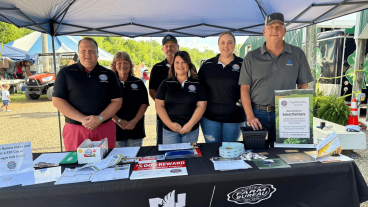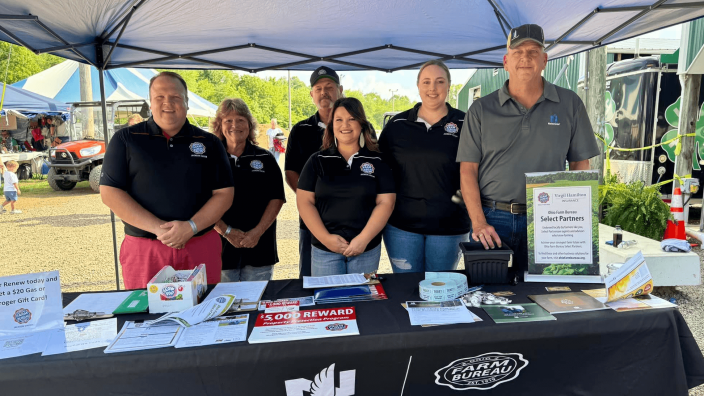Board hosts membership table at Jackson County Fair
The Jackson-Vinton Farm Bureau Board of Trustees set up a membership table at the Jackson County Fair. They partnered with…
Read MoreThese criminals want your information, so they can commit identity theft or fraud, which can be avoidable if you take the right precautions.
Every day, thousands of unassuming Americans are tricked into revealing confidential information. An attacker may seem legitimate and respectable, possibly claiming to be a new employee, repair person, or researcher and even offering credentials to support that identity.
These criminals want your information, so they can commit identity theft or fraud, which can be avoidable if you take the right precautions.
There are three main types of scams that are commonly used to attempt to steal your identity and your money: Phishing is a method which uses email as a source; smishing uses SMS or text messages; and vishing is done over a phone conversation.
“I don’t think you can say there is a target audience or age demographic anymore; we are all targets,” said Jason Bohr, Nationwide’s threat intelligence consultant. “With that said, the less tech savvy you are the more vulnerable you may be.”
No matter what technique is used, there are some red flags to be aware of if someone is trying to scam you. One of those indicators is if a change in payment is being requested.
“Especially if those requests are going to be via ACH or EFT, being transferred through a wiring service or done through gift cards,” said Ryan Praskovich, cyber fraud capability lead with Nationwide. “It always happens in a particular formula, which starts with a reason why the payment change is needed and, ironically enough, the word ‘kindly’ is frequently used which is very rarely used in legitimate emails and conversations.”
Praskovich said another important step to protecting yourself from scam artists is to verify the email address or phone number that is reaching out to you. A simple online search can tell you if an email address is slightly changed or if a phone number isn’t associated with the company the person on the other end claims to be with.
Despite being aware of some of these watchouts, one of the most common mistakes is responding to a suspicious email, text or voicemail.
“In essence, that is the worst thing to do because now your information may be compromised,” Bohr said. “The threat actors will respond immediately and will continue to make their role within a company and the request they are asking of you more and more believable.”
Bohr advises that if something sounds too good to be true, it more than likely is and to verify who you are dealing with first before getting too far down the path of a scam.
“Many people that have fallen victim to these types of crimes have done so because the process just moved too quickly after letting their guard down,” Bohr said. “Even if an email or a call comes from someone you think you know, it’s important to take some extra steps to keep yourself protected.”
Praskovich recommends passwords be longer than 8 characters and don’t use the same password to log into multiple accounts.
“It may be easier to remember one password, but it only takes you entering your credentials once for scammers to have access to all of your accounts,” Proskovich said. “No matter how complicated you think your passwords are, it only takes 5 hours or less to crack an 8 character password. Long, complex passwords can go a long way in protecting you online.”
Bohr and Proskovich shared more of their expertise and how they keep Nationwide associates protected from scam artists on a recent Ohio Farm Bureau Podcast.


The Jackson-Vinton Farm Bureau Board of Trustees set up a membership table at the Jackson County Fair. They partnered with…
Read More

On this Ohio Farm Bureau Podcast, executives from Delaware, Maryland and Pennsylvania Farm Bureaus share what their members are being challenged with on the policy front.
Read More

In a skyrocketing farmland market, it’s more important than ever to make sure you’re protected from the many liabilities that come from farmland ownership.
Read More

Each session will feature new and innovative solutions, research, and information on the latest technology and strategies to protect farms and rural communities.
Read More

Learn about Nationwide’s new Drive the 5 driver safety campaign and find out how some livestock exhibitions rules have been clarified and simplified for the 2024 county fair show season.
Read More

Learn about the new Let’s Champion Rider Safety initiative from Nationwide to spread awareness about ATV and UTV safety. Plus, find out about Ohio State Extension’s new Food Business Central.
Read More

The agents who attended the symposium are all part of Ohio Farm Bureau’s Select Partner Program, an insurance and financial services preferred partnership program for Ohio’s agricultural community.
Read More

Nationwide is helping its agriculture customers take a proactive approach to fire defense through a new partnership. Plus, learn about common fall hazards around the farm and how to prevent them from an expert with Ohio’s Bureau of Workers’ Compensation on this Ohio Farm Bureau Podcast.
Read More

New resources and technology are broadening the different types of sales tools and strategies available to farmers.
Read More

154 farmers, firefighters and other emergency personnel learned critical information about the hazards of working around manure pits.
Read More